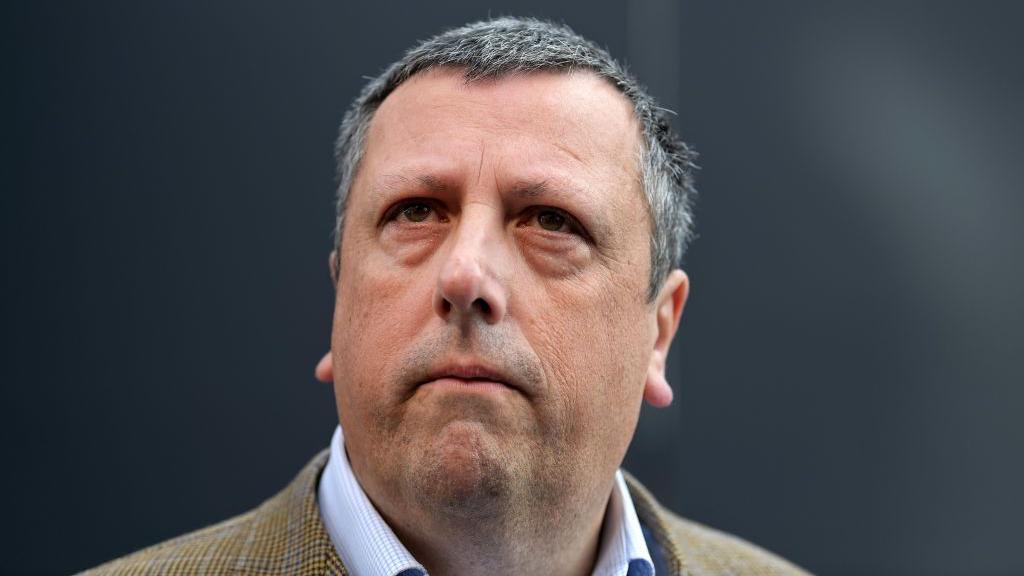Ministerial meetings shine spotlight on LCC

David Campbell, is the co-founder of the LCC
- Published
Should doors on the corridors of power be open or shut to the Loyalist Communities Council (LCC)?
The debate has been fuelled by recent meetings it had with two Democratic Unionist Party (DUP) ministers and comes at a time when some, including the Irish government, are pushing the idea of a formal process of engagement with all paramilitary groups.
The LCC is something of a paradox as a legal entity which represents illegal organisations.
Formed in 2015, one of its aims was to end drug dealing and other criminality within the ranks of the UDA and UVF.
It was also seen as a vehicle to help address a sense that loyalists have been left behind after the peace process and issues like educational underachievement are being ignored.
The involvement of Sir Tony Blair’s former chief of staff Jonathan Powell in establishing the LCC gave it high-level endorsement.
Its co-founder, David Campbell, is its chairman and public face.
He was David Trimble’s top aide when the Ulster Unionist leader was first minister and liaised with loyalists at various points in the peace process.
The LCC is an opaque organisation.
Who sits on it is not published information and it no longer operates a website.
It is not an ordinary community group and in recent years it has been politicking against Brexit’s Irish Sea Border.
It was in this context that it met UK government ministers Lord Frost and Brandon Lewis.
In 2021, the LCC withdrew support for the Good Friday Agreement.
At various points, some details of its members have emerged.
Minutes of the Paul Givan meeting taken by the Department of Education revealed the LCC was represented, along with Mr Campbell, by Jackie McDonald, Robert Williamson and Bobby Rodgers.
When it previously met officials from the Northern Ireland Office (NIO) its delegation included Winston Irvine and Jimmy Birch.
'Recruitment no longer takes place'
These cast lists cover a spread of understanding within the UVF, UDA and Red Hand Commando.
Mr Campbell told BBC News NI last week that LCC members are “former paramilitaries, not active paramilitaries” and that factions targeted by the Police Service of Northern Ireland's (PSNI) paramilitary crime task force, such as the South East Antrim UDA, are not part of its set-up.
He also claimed “meaningful” recruitment no longer took place.
The fact there has been no official, published assessment of the activities of paramilitary organisations - including republican groups the IRA and INLA - since 2015 complicates the picture.
But intelligence points to continuing recruitment by loyalist groups.
The LCC has argued it represents a loyalist leadership committed to transition, that is winding back from criminality and taking steps towards the ultimate objective of disbandment of paramilitary organisations across the board.
It has pointed to a change in the East Belfast UVF as being evidence of progress – though the faction’s crime activities continue.
The Given and Gordon Lyons meetings could be seen as an attempt by the DUP to help loyalism in from the cold.
But it has met with anger elsewhere in the Stormont Executive.
Political debate
Justice Minister Naomi Long is a strong believer in dealing with paramilitarism within strict confines – by way of the PSNI and a £16m a year executive programme of community interventions.
She objects to any engagement prior to groups proving good faith, such as ending recruitment and the control they hold over some areas.
This plays into a bigger debate behind the scenes.
For several years the Independent Reporting Commission, which monitors efforts to tackle paramilitaries, has called for formal engagement with their leaderships to help group transition.
This was considered but not acted upon by the previous Conservative UK government.
A lack of political consensus was a factor in its thinking.
However, it remains on the agenda for further discussion and is being strongly lobbied for by the Irish government.
Reaction to the LCC-DUP meetings is an indicator the move would be no less controversial now than a number of years ago.